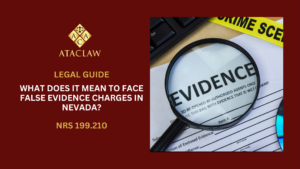When the integrity of the justice system is at stake, Nevada law does not take the presentation of false evidence lightly. As set forth in Nevada Revised Statutes (NRS) § 199.210, individuals who consciously engage in offering forged or fraudulently altered written documents during legal proceedings are committing a grave offense. The repercussions of such actions not only threaten personal freedom but also undermine the fundamental principles of justice. At ATAC LAW, we recognize the critical nature of these charges and understand that knowledge is power when navigating the complexities of the law. In this detailed exploration, we address pivotal questions you might have regarding false evidence charges and provide insight into the path forward for those accused or at risk of conviction.

What Constitutes the Offering of False Evidence in Nevada’s Legal System?
In Nevada, the act of presenting false evidence is explicitly defined under the statute NRS 199.210 and involves several key components:
1. The action of presenting a document as part of evidence in a legal setting, or securing such a document with the intent of it being presented;
2. The awareness that the document in question has been forged or altered in some manner;
3. The attempt to have the document accepted as genuine within the course of the legal proceedings.
The types of documents this statute covers are broad, encompassing books, papers, documents, records, or any other kind of written instruments. This law applies to a wide variety of legal proceedings, including trials, hearings, inquiries, investigations, or any other legal processes recognized by law.
It’s important to highlight that the culpability under this statute does not hinge on whether you personally altered or forged the document, nor does the outcome of the legal proceeding—whether the false evidence swayed the result or not—affect the illegality of the action. The mere act of attempting to deceive a legal proceeding with falsified documents stands as a violation under Nevada law.
Additionally, while this statute focuses on the presentation of falsified evidence, it’s distinct from the crime of forgery (described under NRS 205.090), which involves the act of falsifying documents irrespective of their use in legal proceedings. Similarly, it is separate from the act of perjury (outlined in NRS 199.120), which deals with making false statements under oath. Despite these differences, the penalties associated with forgery, perjury, and the offering of false evidence share similarities, highlighting the legal system’s stance against deceptive practices that threaten the integrity of legal proceedings.
There’s no established case law that specifies whether offering false evidence is a crime that could lead to deportation. Thus, there’s a chance that prosecutors might attempt to use such charges as a basis for deporting non-citizen defendants. Any non-citizen facing charges under this section ought to seek immediate legal counsel. They might be able to have the charges dismissed or downgraded to a crime that doesn’t carry the risk of deportation.
How to Challenge Charges of Offering False Evidence Under NRS 199.210 in Nevada?
If you’re charged with offering false evidence under NRS 199.210, there are several legal defenses that could potentially lead to the dismissal of the charges:
Lack of Knowledge: If you did not knowingly present false evidence, i.e., you genuinely believed the evidence was authentic, your attorney could argue that no crime was committed. The element of knowledge is crucial in these cases. To prove you didn’t act knowingly, your legal counsel could present supports such as prior actions, correspondences, or testimonies that demonstrate your honest belief in the authenticity of the evidence.
Legitimate Evidence: Another line of defense could be proving that the evidence, initially alleged as false, was indeed genuine. This defense requires solid proof, often involving expert witnesses or forensic investigations, who can verify the authenticity of the evidence in question.
Illegal Search or Seizure: If the evidence was obtained through an illegal search or seizure by law enforcement – a violation of the Fourth Amendment – your attorney could file a motion to suppress that evidence. Should the court grant the motion and exclude the evidence, the prosecution may find they lack sufficient proof to proceed with the case, leading to a possible dismissal of the charges.
Given the complexity and nuances of these defenses, it is advisable to engage a skilled defense lawyer who can effectively present these arguments to the court or the district attorney.
Can My Criminal Record Be Sealed?
In Nevada, a criminal conviction remains on your record indefinitely, unless it is sealed. This includes convictions for offering false evidence. However, you have the opportunity to apply for a record seal 5 years after your case concludes. If your charges were dismissed, you’re eligible to seek a seal immediately.
Be mindful, the sealing process can extend over several months. For professional assistance in navigating this process, reach out to ATAC LAW. Our expertise can help you move toward a brighter future with a clear record.
For further legal assistance and to discuss your case with an expert, don’t hesitate to contact ATAC LAW.
